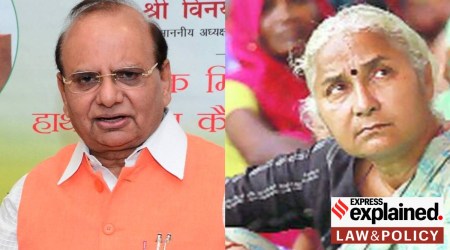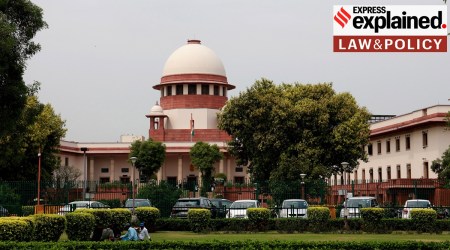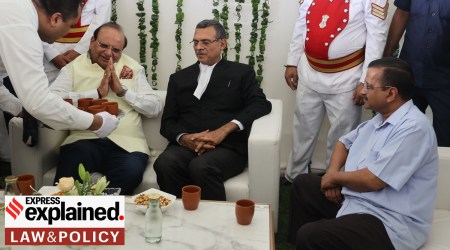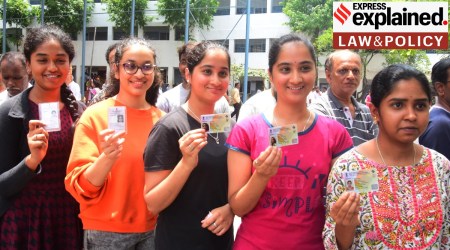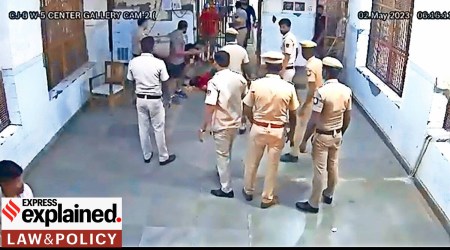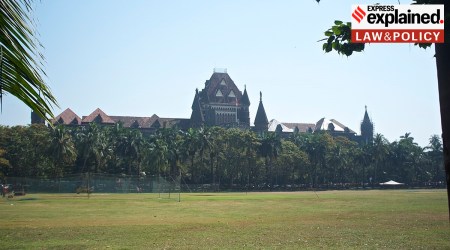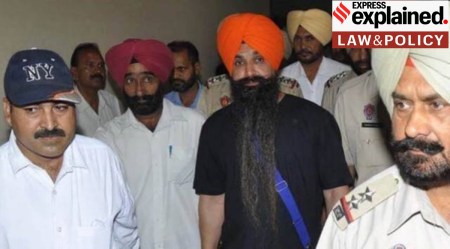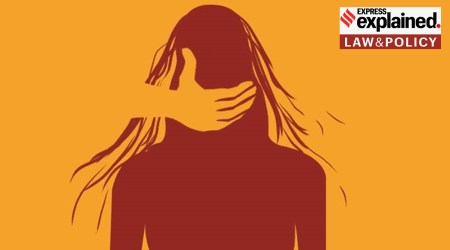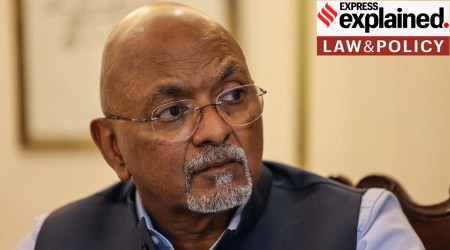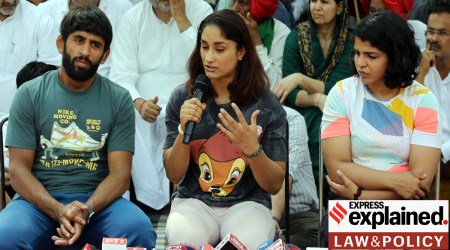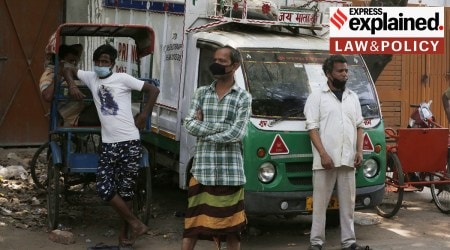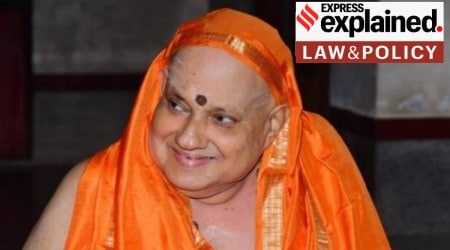EXPLAINED LAW NEWS - Page 26
SC reserves verdict on same sex marriage: Here are the arguments made over 10 daysSubscriber Only
Pleas to legalise same sex marriage: Here is a day-by-day account of the arguments before the Supreme Court.
Activist Medha Patkar vs Delhi LG Saxena: Recalling a case of assault from 2002Subscriber Only
Saxena, who took over as Delhi LG in May 2022, had filed an application before the court on March 1, asking that the proceedings in the case be kept in abeyance for the period he is in the post.
SC verdict on control over services: What tilted scales in Delhi’s favourSubscriber Only
The five-judge Constitution Bench said the decision would further “the basic structure of federalism”.
Key takeaways from Supreme Court’s Maharashtra verdictSubscriber Only
The court stressed on the distinction between legislature party and political party, and shed light on rules, procedures Speaker should follow.
Supreme Court redraws lines for Constitutional offices, holds up sanctity of elected govtsSubscriber Only
In the Delhi ruling, the apex court speaks to the Centre in emphasising that principles of democracy and federalism are basic structure of the Constitution.
Maharashtra crisis: Why the 2016 Nabam Rebia ruling has been referred to a 7-judge BenchSubscriber Only
The Uddhav Thackeray faction had asked for the reference. The Shinde group had cited Nabam Rebia when the crisis unfolded in June 2022 to contend that the Deputy Speaker cannot proceed under the Tenth Schedule against the dissident Sena MLAs as a notice seeking his removal was pending.
Supreme Court rules in favour of Delhi Govt in tussle with Centre: Here’s what the case was aboutSubscriber Only
The matter, comprising various issues, has wound its way up from the Delhi High Court, which ruled on it in 2017. There are many twists and turns in the story, and judgments by multiple Benches. The SC verdict will be crucial, with far-reaching impac
The law on polygamy among religious groups in IndiaSubscriber Only
Polygamy is the practice of having more than one married spouse — wife or husband. The issue is governed both by personal laws and the Indian Penal Code (IPC).
Karnataka HC allows free food to those who voted in state polls: What is the caseSubscriber Only
The HC ruled that serving food for free or at cheaper rates to people who had already cast their votes would not be 'inducement', subject to some conditions. Here are the conditions.
Why question of ED chief’s tenure is back in Supreme CourtSubscriber Only
The SC on Monday reserved its judgment on a batch of petitions challenging the third extension given to Mishra.
Suspended after Tajpuriya murder: Why Tamil Nadu cops were deployed at Tihar jailSubscriber Only
The Director General of Prisons in Delhi wrote to the Director General of Tamil Nadu Special Force regarding the incident, after which the force on Sunday suspended seven officers and called them back to the state.
Why Bombay HC has said FM channels must pay royalties to composers and lyricistsSubscriber Only
The court said that the FM channels would be restrained from using copyrighted music if they fail to pay the royalties to Indian Performing Right Society (IPRS) which has been fighting for performers' and creators' rights for decades.
Manipur violence: What are ‘shoot at sight’ orders and how can they be imposed?Subscriber Only
A "shoot-at-sight" or firing order may be passed in terms of the statutory powers relating to the arrest or prevention of offences or for disbanding unlawful assemblies under Sections 41-60 and Sections 149-152 of the CrPC, 1973.
SC refuses to commute Rajoana death penalty: The long legal battle of Beant Singh assassination convictSubscriber Only
In 2009, Rajoana had written to the Punjab and Haryana HC Chief Justice terming his death sentence 'justice' and a 'blessing'. How did his case then reach the SC?
The PoSH Act, and the procedure for complaint against sexual harassment at the workplaceSubscriber Only
The PoSH Act was passed in 2013. It defined sexual harassment, lay down the procedures for complaint and inquiry, and the action to be taken in cases of sexual harassment.
With Supreme Court’s ruling on divorce, a look at its powers under Article 142 – and their criticismSubscriber Only
The power has been criticised on grounds of the separation of powers doctrine, which says that the judiciary should not venture into areas of lawmaking and that it would invite the possibility of judicial overreach.
Amid Justice Gangopadhyay row, recalling retd HC judge Karnan’s battle with SCSubscriber Only
In May 2017, former Calcutta HC judge Justice CS Karnan was sentenced to six months in jail for contempt of court, making him the first sitting judge in the history of the Indian judiciary to go to jail.
Supreme Court rules it can directly grant divorce to couples under Article 142: How this worksSubscriber Only
The process of obtaining a decree of divorce is often time-consuming and lengthy owing to a large number of similar cases pending before family courts.
Actor Sooraj Pancholi acquitted in Jiah Khan suicide case: Understanding the abetment of suicide law
Abetment of suicide is a serious offence that is punishable by imprisonment up to ten years. However, it is not easy to prove in a court of law.
Supreme Court same-sex marriage hearing: What is the Centre’s stance on the matter?Subscriber Only
The Centre's arguments in the SC covered issues from privacy to personal laws. Here are the six key points it raised.
50 years of basic structure doctrine | Only safeguard against majoritarian govt: Sr Advocate RamachandranSubscriber Only
Ramachandran, former Additional Solicitor General of India, was once a critic of the doctrine. Now a “qualified critic”, Ramachandran said changes to secularism, federalism and equality will be the next aspects tested against the basic structure doctrine.
Wrestlers in SC against Delhi Police: What the law says about filing of FIR in sexual harassment casesSubscriber Only
Solicitor General Tushar Mehta told the SC that the Delhi police feels there is need for a ‘preliminary inquiry’ before registering the FIR against Brij Bhushan Sharan Singh.
Flexi working hours: Why Tamil Nadu’s new labour law is contestedSubscriber Only
The Stalin government will meet representatives of trade unions to build consensus on an amendment to the Factories Act that the Assembly has passed.
Kesavananda Bharati case: How a divided courtroom set Parliament-Constitution rules of engagementSubscriber Only
Fifty years ago, by the narrowest possible margin of 7-6, a 13-judge Constitution Bench of the Supreme Court ruled that the “basic structure” of the Constitution is inviolable and cannot be amended by Parliament.
50 years of Kesavananda Bharati case and its legacy: How Supreme Court has invoked the basic structure doctrine over the yearsSubscriber Only
Over the decades, the basic structure doctrine has been criticised repeatedly — for diluting the principle of separation of powers and undermining the sovereignty of Parliament, and as a vague and subjective form of judicial review.
BEST OF EXPRESS





